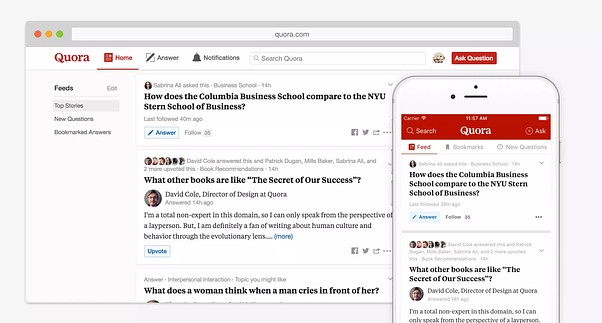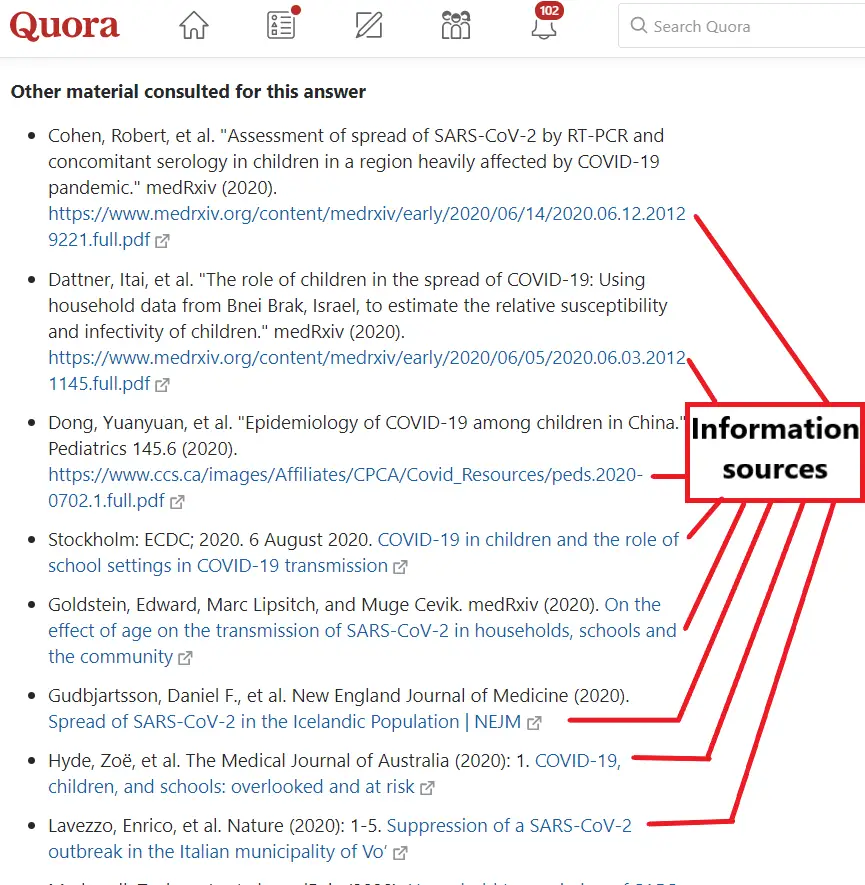No. Quora is not a reliable source of information. Answers on Quora are mostly based on individuals’ views, opinions, and personal experiences that vary across users.
Although one can get few credible and trustworthy answers on Quora, it’s best to fact-check every piece of information.
The extent of information credibility on Quora
Quora is a popular question-and-answer website.
With over 200 million monthly users engaging actively on the platform, Quora provides answers to the majority of the world’s most asked questions.
It’s a direct and easy way to communicate with other Internet users, ask questions, and receive answers about topics that interest you.
But like every other question and answer site out there,
Answers provided to questions on Quora are not entirely credible.
They are more of individual opinions than real, verifiable facts.
I’ve been an active member of Quora for about seven years and I’ve discovered that most of the questions on Quora follow a (75 – 25) % reliability ratio.
It means that just about 25% of answers to a question are valid.
The remaining 75%, which makes up the bulk of the responses, is full of misinformation, humor, trolls, incorrect beliefs, and political sentiments.

The 5-Test Validity Rule for Quora Answers
Let’s say you’ve gotten an answer to your question on Quora.
Before proceeding to additional platforms to double-check the response,
make sure you pass the information through the 5-test validity rule stated below.
- Check if the answer cites references or contains verifiable statements.
- Ascertain if the answer is an opinion-based or factual statement.
- Check the bio of the author. Is the person skilled in the given field or known for providing quality answers?
- Check the nature of the question. Is the question asked opinion-based, fact-related or hypothetical? Or does it require a personal experience-based answer?
- Is the answer provided universally applicable?
Let’s see how these different factors affect the validity of Quora’s information.
Verifiable and Non-verifiable sources
You will agree that information appears credible when linked to verifiable sources.
What does it mean for information to be linked to verifiable sources? I’ll explain.
Take a look at this question asked on Quora.
Can children spread the COVID-19 virus as easily as adults?
A Quora user by name, Tirumalai Kamala, gave a tentative answer to the question.
But it didn’t end there. She also presented a list of resources consulted and linked to each one at the end of her response.
See a snapshot below.

With this level of information, one can easily click through to verify the authenticity of her response.
Information sources can be outlined at the end of an answer like this one or linked to in between the write-up.
It doesn’t necessarily mean that every piece of information on Quora must have a detailed citation, but it should at least contain links needed to verify the statements or claim.
Again, written content can either point to a primary information source or a secondary information source.
A piece of information is only considered reliable when it points to a primary information source.
A website as an entity can either be a primary or secondary information source.
In one of our previous posts, we made it clear that a website is a primary information source if it contains original ideas, direct research, or first-hand evidence about an event, object, person, or work of art.
It can exist in the form of:
- published blog posts,
- articles,
- interviews and surveys,
- public opinion polls,
- original designs, and photographs.
Primary source websites serve as large database of archives and they give direct access to the subject of your research.
On the other hand, a website is a secondary information source if it evaluates, analyzes, interprets, summarizes and processes primary sources.
Secondary source websites provide second-hand information and commentary from other researchers.
Answers on Quora linking to secondary source websites are not reliable and further verification must be carried out to determine the authenticity of the information.
You must know that this process doesn’t just apply to Quora alone but serves as a general means for verifying information on the internet.
If we have answers on Quora pointing to external websites,
how can one ascertain if the linked website is a primary or secondary source website?
There are different ways to tell if a website is a primary source or secondary information source.
Extracted from our article “is website a primary source” the two significant ways to distinguish primary from secondary source website is to:
- Check the domain extension of the websites
Website with domain extensions of .edu/, .gov/, .org/, and .int/ are mostly primary sources with a very high level of credibility. Eg (Harvard.edu, usa.gov, who.int)
- Check if the website has a known relevance or authority on the given subject under consideration
For example,
Healthline.com is known for providing quality information relating to health conditions.
Over the years, they have continually shown expertise and health-related information provided on such websites can be considered reliable.
Same way,
Afrilcate.com chunks out high-level informative content on science courses for high school students and can also be categorized as a reliable information source in the education niche.
If responses are linked to authoritative websites like the ones mentioned, then the information is reliable.
A non-verifiable distinctive statement can be considered reliable.
Opinion based or Factual based Answers
Rendering an opinion-based answer instead of a factual one to specific questions can’t be considered reliable.
Unfortunately, opinion-based answers are widespread on Quora.
Although individual opinions matter, some questions require nothing but factual answers.
Distinguishing opinions from facts isn’t an easy task.
Some users can pitch their opinions in a well-detailed manner that one may think it’s factual.
To be on the safe side, confirm the credibility of the answer from other information outlets.

The Author’s Bio
Another good move in determining the credibility of Quora information and a vital component of the 5-test validity rule is to check the author’s bio.
Even if there are many trolls on Quora, they are also experts and specialists on Quora.
Tirumalai Kamala mentioned above is arguably the best medical sciences authority on Quora.

A quick search on Google shows she co-founded the National Institute of Health Visiting Fellow Committee (NIH-VFC), USA (2001 – 2007)
She has bagged multiple awards and recognition in medical sciences, most especially in the field of microbiology.
A Quora Top Writer since 2015, and most of her answers on Quora have been published by global brands like Apple News, Forbes, HuffPost, International Business Times, Medical Daily, Mental Floss, Newsweek, Slate and Sporting News.
Another Quora expert in the field of marketing is Neil Patel.

A New York Times best-selling author and listed by Forbes as one of the top 10 marketers.
President Obama recognized him as a top 100 entrepreneur under the age of 30 and a top 100 entrepreneur under 35 by the United Nations.
There are many more niche experts on Quora; you have to sieve them from the crowd.
Since these professionals are skilled in their field,
One can decide to take their answers on Quora to be credible even without going the extra mile to verify the information.
Hey, don’t get me wrong here.
I’m not saying that everything written by experts on Quora is correct and should not be verified.
Hell no.
But most expert-led answers are correct and can be taken credible when no means of verification is outrightly available.
The Nature of the Question
Not all questions require factual or validated answers.
Some questions aim to seek the opinions of different Quora users.
The person seeking information then goes through all the answers and picks a choice that best suits his criterion.
There are different categories of questions on Quora.
Questions can either be fact-based or hypothetical.
A hypothetical question is based on supposition, opinion, personal belief, or conjecture, and not facts.
It isn’t grounded in reality. It primarily deals with potential acts and events, as well as something that hasn’t happened yet but could happen.
This sort of question usually requires the questioner to arrange imaginary parameters for the things he supposes.
For example, questions like:
Who is more powerful: an Army General or a Business Man?
The answers to such questions will be flooded by different opinions.
Users will further try to buttress their point to make you see reasons why their response is the best compared to others.
For such a question, no answer is wrong or right, as it all depends on different factors under consideration.
On the other hand, some questions are strictly individual-dependent.
Answers are more like personal tales to the user and are considered reliable straight off the bat.
Questions like:
Who’s your favorite Youtuber?
What are some war photos that genuinely make you feel sick?
Let’s go with the first one.
My favorite Youtubers are Ali Abdaal, Leon Hendrix, Adrian Twarog and Tayo Aina from Nigeria.
This will differ across Quora users.
As a result, no answer can be considered credible over the other.
Questions about religion and spirituality, politics and sports do fall under this category.
Universally Applicable Answers
When answers are universally applicable, proven and effective, they are generally accepted as accurate knowledge.
Questions like “how-to guides” needed to carry out particular tasks should have universal answers that are tested and trusted.
However, conventional wisdom is often wrong, and for some reason, some questions will have dozens of people repeating the same conventional wisdom.
Some users will browse the internet, copy answers from any website without checking the credibility of the answer or the website, and dump it on Quora.
So don’t just feel answers on Quora is reliable because it’s conventional.
Try to go in-depth a little by looking beyond general statements.
Correlation between Quora answer metrics and the credibility of information
Metrics/signals available on Quora include:
- Upvotes
- Downvotes
- Authors award
- Collapsed answers
The idea of these metrics is to push the correct answers to the top feed.
This increases its visibility and the contents are easily digested by users with no hassle.
But in the actual world, it doesn’t follow that path of reasoning on Quora.
We’ve seen people upvotes wrong answers while the correct answers are downvoted or backlashed with negative replies.
Everyone could believe that 3+3 = 10 doesn’t mean it’s a reality.
Users tend to upvote humorous or funny answers than actual truth.
Open Confession by a Quora User
I’m not innocent of upvoting a sarcastic answer because I thought it was hilarious. It happens.
Also, not all authors with Quora’s award tag mark are credible.
Reasons?
There have been recorded cases where one user spanned Quora by dropping multiple questions in a bid to win the Quora’s Top Questions award.
The Quora Content Review Team performs its tasks well to remove spam and cleans the platform from users who continuously downvote and report substandard content.
They somehow missed this user and he was awarded the title.
Some answers on Quora are collapsed (hidden) because they go against Quora’s content policy.
But I’ve extracted answers that are way better than the approved responses from the collapsed section on multiple occasions.
In as much as these metrics exist to help determine quality answers,
Always remember that:
There’s no Correlation between Quora answer metrics and the credibility of information.
Users’ responsibility in increasing the credibility of Quora
As human population and internet users increases, there’s bound to be a corresponding increase in popular question and answer platforms like Quora.
It’s up to us to make such content farms a better place for the upcoming generation.
Here are a few tips on how you can contribute to increasing the credibility and reliability of Quora.
- Try to provide references or links to other reliable sources when answering questions.
- Verify your information before posting on Quora.
- Don’t drop opinion-based answers to fact-based questions.
- When corrected on a piece of information you believe to be accurate, double-check your answer. If wrong, make changes as soon as possible.
- Don’t downvote quality answers or drop a negative reply to factual statements.
- If you are not sure of an answer or can’t provide proof, start with statements like: “I heard….”, “I believe….” or put a slight disclaimer in your wordings.

Final Thoughts
Just like everything on the internet, take everything you see with a pinch of salt.
When assessing material found on the internet, you must always be cautious.
The underlying benefit of Quora is that even if you don’t get a satisfactory answer, there’s a good chance you’ll get advice from subject experts and tips on how to approach your issue or problem from different perspectives.
You can use Quora as a starting point for your search.
It’s highly advisable to read as much as you can from various sources before making your judgment.
Readers Request🏆
There have been reports from Quora users complaining about receiving death threats on the platform, people stalking other users down to their family members and many other depressing acts.
All these negative vibes just because they shared their opinions on some critical subject matters.
Is Quora still safe for users all over the world?
How about user’s privacy when across the platform? is there any form of data breach on Quora?

See our recently published article on Quora’s safety and security through the link below.
